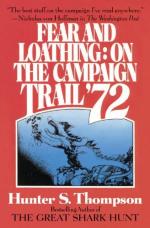
|
| Name: _________________________ | Period: ___________________ |
This test consists of 5 multiple choice questions, 5 short answer questions, and 10 short essay questions.
Multiple Choice Questions
1. From "January, February, into March," what is the core conflict between Thompson and the politicians?
(a) Class issues.
(b) Kent State.
(c) Vietnam War.
(d) Legalization of marijuana.
2. In "January, February, into March," what is the reason Thompson makes several people angry with him?
(a) He punches Mankiewicz.
(b) He gets very drunk in front of the President.
(c) He refuses to remove his hat.
(d) He is caught with hashish.
3. What is one of the reasons Thompson is so famous?
(a) Thompson single-handedly calls out an entire governmental branch on their corruption.
(b) Thompson wins the Pulitzer.
(c) Thompson marries into a famous family.
(d) He has a rebellious image, though everyone tolerates him.
4. According to Thompson's anecdote, in "February & March," where does McCarthy go to gain favor with the working class?
(a) A university.
(b) A factory.
(c) A slaughterhouse.
(d) A retirement community.
5. How does Thompson prefer to do his work?
(a) Easily and slowly.
(b) In the shower.
(c) With a collaborator.
(d) With heavy deadlines.
Short Answer Questions
1. In this book, what is used to separate groups of paragraphs?
2. Despite the opinions politicians hold of the press, which of the following is not a trademark of Hunter S. Thompson (illustrating the man's indifference to what the politicians think of him)?
3. In Thompson's estimation, in "Dark Interlude," what is the real problem with political conflicts?
4. In the meeting at the ballroom, what does Thompson hypothesize as being Wallace's goal?
5. When Thompson hears a specific sound during the May primary, which group does he claim this sound would particularly distress?
Short Essay Questions
1. How does Thompson discuss the progressively more open drug use amongst the journalists?
2. What is significant about Hunter S. Thompson's description of himself?
3. Why does Thompson encounter difficulty in becoming an official member of the press for the federal government?
4. In "January, February, into March," how does Thompson try to fit in with the politicians and press?
5. How does Jerry Rubin tarnish Thompson's reputation?
6. What does Thompson believe about Southern attitudes, particularly in regards to politicians?
7. What is significant about Eagleton's hiding his battles with depression?
8. What are some characteristics of Thompson's writing?
9. Describe the different votes Thompson discusses in "January."
10. In the early days of the campaign trail, how does Thompson's demeanor and attire compare to the other journalists?
|
This section contains 1,133 words (approx. 4 pages at 300 words per page) |

|




